 Over the last few weeks, I’ve watched (on Netflix) two seasons of Resident Alien, a SyFy television adaptation of the same-named comic series. A third season finished airing on the SyFy channel earlier this month but isn’t yet available on Netflix.
Over the last few weeks, I’ve watched (on Netflix) two seasons of Resident Alien, a SyFy television adaptation of the same-named comic series. A third season finished airing on the SyFy channel earlier this month but isn’t yet available on Netflix.
Both the comic and its adaptation are stories about an alien stranded on Earth, but the adaptation is a severe departure from its source text. Worse from my point of view, the television show is an Idiot Clown comedy, and I’ve never cared for those. In its favor, though, it stars the inimitable Alan Tudyk.
The pity is that the comic story is much better — and much smarter — than the adaptation but has been almost entirely discarded.
Warning: Spoilers ahead!
Resident Alien, the comic series, is written by Peter Hogan and drawn by Steve Parkhouse. It began in 2012 and consists of seven miniseries installments. The first six comprise a long arc, the seventh, which was published last year, is something of a sequel and potentially the beginning of another long arc.
The story follows Hah Re, an alien biologist sent to here to destroy a probe his people were using to monitor Earth. They don’t want it discovered. Unfortunately, his ship is noticed and shot down. The disabled ship crashes in the US Southwestern desert.
Hah Re does destroy the alien probe as well as his ship, though enough of the latter remains to be discovered by “Men in Black” — who begin a search for its pilot. His face is also captured by an ATM camera he hacks to obtain funds.
Taking the name Harry Vanderspeigle, and using mental powers that make him appear human, he rents a cabin on the outskirts of the (fictional) small town Patience, Washington, and presents himself as a retired doctor.

“Dr. Harry Vanderspeigle” hanging out with some townspeople.
Three years later, the town doctor is murdered. The mayor and sheriff enlist Harry’s help in examining the body. The mayor asks that he temporarily be the town’s doctor. Harry — who loves mystery novels and films — decides to solve the murder. The empathic abilities that make him a good doctor also let him know when someone is lying.
He doesn’t find the killer, but his efforts worry the killer — who has killed two others — into an attempt on Harry’s life. Which fails, in part because of one of his nurses, Asta Twelvetrees, the daughter of Dan Twelvetrees, a Mohawk shaman.
Asta can partially see through Harry disguise but mistakes him for a visiting spirit. Her father, however, sees Harry clearly but also sees he has a good heart. Dan suggests Asta not reveal to Harry what they know.
Harry realizes he was lonely and enjoys being the town’s doctor, so he agrees to stay on the job. He also, in the tradition of amateur detectives, solves mysteries. Each miniseries consists of a mystery for Harry along with his evolving life in Patience and a growing relationship with Asta.
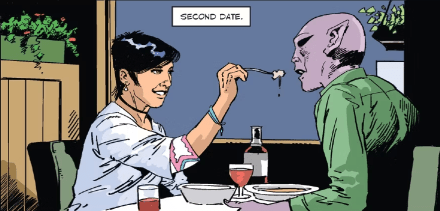
Asta and Harry, later, as their relationship becomes romantic.
In the comic, Harry is always drawn in his true form. His mental abilities allow him only to appear human (with some rare exceptions). Cameras aren’t fooled, hence his appearing on the ATM camera. In places with surveillance cameras, his technology lets him temporarily disable them. Even so, the Men in Black find clues that put them on his trail.
Big spoiler this paragraph: Ultimately, Hah Re’s people come to rescue him, but Harry decides he loves Earth too much to return. He also knows his lover back home decided not to wait for his return so there is little left there for him. In a cute twist, the government agent who finally discovers him decides he’d rather leave Earth and be with the aliens. This effectively (more or less) ends the search (because the agent reports back founding nothing).
The comic is, in a word, delightful. It’s smart, compassionate, very human, and hard to put down. It revived my long-dead interest in comics and has me poking around for others. I’ve even read some manga, which never interested me before (mostly because they’re in black and white).
§
The television adaptation… is different on every level. To my eyes it suffers from extreme stupidity, both in presentation and writing. While the comic is drama with light overtones and prominently a mystery series, the adaptation is an idiot clown comedy — which requires characters utterly lacking in self-awareness or intelligence to the point of being cartoon caricatures rather than characters.
The show’s plot takes only a few elements from its source. Mainly, that Harry is an alien stranded on Earth. It also has Asta as Harry’s nurse, but her backstory is radically different. And other than a few nods to the comic for apparent fan service, that’s about it.

Left-to-right: Asta (Sara Tomko), Harry (Alan Tudyk), and Max (Judah Prehn). Only Max can see through Harry’s disguise.
The alien (played by Alan Tudyk) was sent to Earth to drop a device that will wipe out all human life on the planet. His people fear Earth’s violent tendencies and determine to remove the threat they pose. (And yet, who is the more violent here?) His ship is hit by lightning and crashes (but isn’t destroyed, just disabled).
The alien (whose name is a long string of Tudyk mouth noises) finds himself in Patience, Colorado, where he kills Dr. Harry Vanderspeigle, a doctor living alone in a small cabin outside of town. The alien then physically transforms into Vanderspeigle and takes his identity.

The alien’s true form (shortly after he crash lands). A small pair of secondary arms nestles against its chest.
This introduces a major inconsistency. Despite this physical transformation, a small percentage of people (the canonical “one in a million”) see his alien head and hands even though his body retains human proportions (the alien body is much bigger). This version of the comic’s idea that some see past Harry’s mental disguise makes no sense to me.
It turns out that Max Hawthorne (Judah Prehn), son of Ben and Kate Hawthorne (the mayor and his wife, played by Levi Fiehler and Meredith Garretson), is the only one who sees through the disguise. Of course, no one believes him because he’s known to be an “imaginative” and sometimes difficult child.
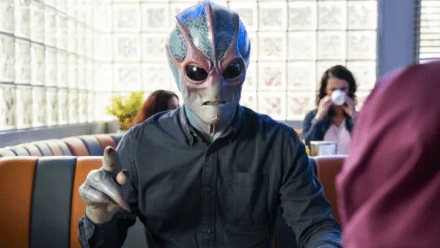
How Max sees Harry but note the human body form. And the hands!
The story begins with sheriff Mike Thompson (Corey Reynolds) asking Harry to investigate the murder of the town’s doctor. From that point on, the story is largely unrecognizable from the comic. Here the alien’s mission is to wipe out human life, despises “monkeys”, and is murderous at heart. He aches to find his lost device and complete his mission.
The mayor asks him to fill in for the dead doctor. Realizing that refusing would call too much attention, he finds himself stuck as the town doctor. He also must deal with Max — who he attempts to kill. Over time he begins to see the value in humanity and eventually sides with them against his people, who he expects to eventually come to complete his failed task.
Asta Twelvetrees (Sara Tomko) learns of Harry’s identity accidentally when they both fall down a glacier crevasse up in the mountains. Harry is searching for his device. Asta and best friend D’arcy Bloom (Alice Wetterlund) learn he’s in a danger zone and snowmobile up there. All fall through the ice — Harry and Asta to the bottom (where Harry is badly wounded). D’arcy lands on a ledge higher up and ultimately climbs out and rescues them. But Harry has to reveal himself to Asta so she can save his life. She’s freaked out but manages to adjust.
Meanwhile, the Men in Black, headed by General McCallister (Linda Hamilton) have found the alien’s ship and are trying to find its pilot.

General Eleanor McCallister (Linda Hamilton), who as a child saw a UFO and now heads the Men in Black hoping to confirm her childhood sighting.
Max enlists the help of schoolmate Sahar (Gracelyn Awad Rinke) to help him do something about this alien. Eventually, however, they become friends (with reservations).
Harry ultimately learns his people are afraid to come to Earth because another alien race has is already here (with poorly defined intent). A scene 50 years in the future reveals Harry (in alien form) wandering a burned wasteland. He stumbles on a time portal that returns him to Earth’s past some years before his ship crashes. He becomes a famous, but secretive, artist named Goliath whose paintings contain clues leading Harry to find him. Unfortunately, Goliath (Harry) has died leaving behind an egg containing their child. The egg hatches, the highly carnivorous infant at first posing problems for Harry and Asta, but eventually the infant aligns with Harry, passing him a telepathic message from Goliath about the Gray aliens seeking to take over and/or destroy Earth (as mentioned, it’s poorly defined).

Goliath.
I mention this because the Goliath storyline exists in the comic but in very different — and vastly — superior form. Goliath is a different alien species also stuck on Earth but finds love and success as an artist.
His species is large (hence his name) but highly moral and gentle. He is tormented by a killing he committed (essentially accidentally) and, with Harry’s blessing, allows himself to die because he can’t live with himself.
It’s one of the most touching arcs in the comic, and I’m pissed the adaptation writers shat on it.
The second season ends with a raid on the government alien prison by Harry and Peter Bach (Terry O’Quinn) the “Alien Hunter” — who also sees Harry’s true form. Originally, he’s after Harry but then bands with him hoping to find the son abducted from his wife’s womb long ago. Harry wants to recover his infant son, who was captured by the Men in Black.
§
My main problem with the show is the idiot clown tone. Just about everyone is stupid beyond reason, and the humor is infantile. I ended up with three pages of notes but easily could have a page per episode (10 in season one, 16 in season two).
The first season wasn’t awful. Alan Tudyk is fun to watch. I found season one had enough twists and turns to keep me interested despite the extreme dumbness of almost every character. Asta’s adopted father (Gary Farmer), who here runs a diner but isn’t a shaman, is one of the only characters with any measurable sense. Everyone else, save usually Asta, is as childish as Max (who has the excuse of being a child).

Dan (Gary Farmer) and adopted daughter Asta (Sara Tomko).
I found the show increasingly hard to watch. Season two was frequently excruciating. Much of the humor around Harry involves what I call Mork’n’Mindy-isms after the 1978-1982 sitcom starring Robin Williams and Pam Dawber (a show even then I found too dumb to watch). That show, like this show, is a fish-out-of-water tale. But Mork’s jokes revealed a deep and nuanced understanding of Earth culture. The humor here depends on Harry’s ignorance of Earth yet shows a deep understanding he can’t possibly have.
The show reminds me of sitcoms from the 1970s and 1980s, on which I suspect the writers were raised. (The show even borrows the theme songs from Cheers and M*A*S*H.)
And there is a whiff of toxic femininity, the strange recent response to toxic masculinity (which often seems to include any masculinity). D’arcy is a particular offender here. Asta’s backstory includes a marriage to the abusive Jimmy (Ben Cotton) and giving up her daughter for adoption. While Jimmy is later shown to have evolved some, D’arcy at one point releases the parking brake on Jimmy’s unoccupied truck letting it roll downhill into traffic. She’s lucky no one was injured (let alone killed), and her act is presented as a righteous blow (as opposed to vandalism and public endangerment).
A subplot of the show is Asta’s attempt to reconnect with her daughter. In general, the show is heavy on personal subplots. Asta seeks her birth mother (who turns out to be a piece of work) and D’arcy is a trainwreck — a seriously toxic and disturbing human.
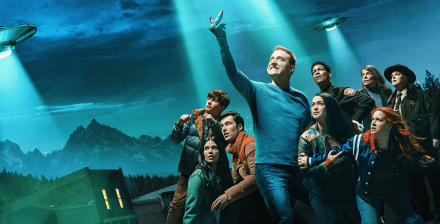
Kinda sums up my view of the show!
It’s interesting to compare the male/female matchups: Harry and Asta; Mayor Ben and wife Kate; Sheriff Thompson and Deputy Baker (Elizabeth Bowen); Max and Sahar. In each case, the men are generally ineffectual, childish, and dumb.
As I’ve said many times, I love strong female characters, but I decry this modern tendency to diminish male ones. (Consider recent depictions of Luke Skywalker, Han Solo, and Indiana Jones.) Feminism was about equality for women — leveling the field — but now writers have tilted the playing field the other way, sometimes in the extreme.
Frequently, toxic behavior in women is excused with the notion that, “if a man did it, you’d applaud, right?” No, wrong. Toxic people are assholes regardless of sex. The very behaviors past feminists opposed now seem gleefully adopted by some women.
§
Of note, both Alice Wetterlund (D’arcy) and guest star Michael Cassidy (Dr. Stone) were major characters in the vastly superior TBS alien invasion comedy, People of Earth (starring Wyatt Cenac). It was smarter and funnier but lasted only two seasons. Go figure.
Science fiction fans remember Alan Tudyk as Wash, the pilot on the outstanding Firefly, a show that tragically lasted only one season, but which holds a place forever in our hearts. That show’s star, Nathan Fillion, gives voice to the octopus in Resident Alien. Since Firefly, Alan Tudyk has rightfully been one of Hollywood’s hotter properties, often giving voice to animated characters.
And Star Trek alumni George Takei voices the gray alien.
§
Lastly, Resident Alien seems to take seriously the idea of UFOs. The last episode of season two opens with a monologue by Mike Richardson, an executive producer on this show and CEO of Dark Horse Comics (which published the comic). He relates seeing a UFO as a kid. The episode is interrupted a number of times for what seem real interviews with people claiming to have seen UFOs. But one of those is character Deputy Liv Baker, who in the show saw a UFO as a kid, so it’s hard to tell if these are meant seriously or not.
Let me be clear here: It’s! Not! Aliens! Richardson’s description of a flying saucer with a spinning outside is from early science fiction. He goes on to say that it was “consistent with our conception” of UFOs. That’s like saying something is consistent with our conception of unicorns. I really hope this was all a put on.
§ §
Bottom line: I found the show too stupid and infantile to enjoy. Your milage may vary. I’d say the first season might be worth checking out. I’m left trying to decide whether to watch the third season when (and if) it shows up on Netflix. Right now, it’s 50/50 with a leaning towards nope.
Stay alien, my friends! Go forth and spread beauty and light.
∇
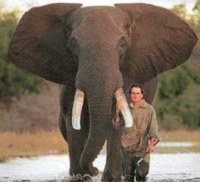




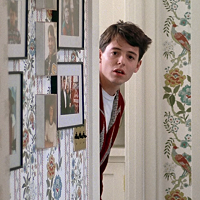






April 13th, 2024 at 11:24 am
Wondering about your sense of …completion… maybe, in enduring a show that sounds less that par, more like ugh! Why watch it?
April 13th, 2024 at 12:32 pm
Until the last decade or so, I found it very hard not finishing things I started. In my “old age” I’m a bit more willing to bail — why waste whatever time I have left with crap?
Part of what drives me (beyond just wanting to finish what I start) is wanting to give the writer (or director) a full chance. There have been things that ultimately redeemed themselves, though that’s pretty rare. And, once I get sucked into a storyline, some part of me wants to see how it turns out. There is also that I don’t feel I can complain about something I didn’t finish. Unless it’s so awful that complaining is fully justified; case in point, the adaptation of Cowboy Bebop. For example, I don’t think I can blog about the Netflix adaptation of The Three-Body Problem because I bailed after just two episodes.
April 13th, 2024 at 11:55 am
I share some of your reactions to the SciFi TV program. I have not read the comic series so I can’t compare and contrast the two. I stumbled onto the TV adaptation and for some odd reason kept coming back even though I had mixed feelings about the writing. I justified my continued watching with the argument that the series was, in part, a modern version of sorts of “The Persian Letters” written in the Eighteen Century by Baron de Montesquieu. In that work Montesquieu has two fictional Persian noblemen write about the strange customs of the French. It was a way for Montesquieu to give his French audience a different perspective—and critique—on French culture. I noted that the SciFi series gave Harry many opportunities to comment of Human civilization. But I agree, the characters and writing are just too difficult to allow me to suspect my disbelief. I agree with your Mork and MIndy comments. I just could not sit through one episode of that trash. I ended my watch of Resident Alien with the first season.
April 13th, 2024 at 12:45 pm
I sort of wish I had — I had many more issues the second season. Part of the problem was that I’d read the comic series by then, and the contrast between them was stark and dismaying.
Fish-out-of-water, when done well, is a great way to compare and contrast points of view. The theme bothered me in Resident Alien on two levels. Firstly, I found the Mork-n-Mindy-isms grating. Secondly, although Harry’s on-screen behavior doesn’t evolve much — he continues to be astoundingly stupid about Earth culture — his off-screen narration reveals deeper nuance and, as you say, makes interesting commentary on human civilization. One might believe it’s a much older more experienced version of himself — a future Harry.
It might say something that the creator of Resident Alien is Chris Sheridan, who is most noted for his involvement with Family Guy (a show that never interested me, which I never watched, but which I got a sense was pretty dumb). The kind of almost slapstick idiot clown comedy found in cartoons (The Simpsons, for example) plays better, I think, than live-action with actual humans. That’s a key reason I think most adaptations of comics or cartoons fail.
April 13th, 2024 at 12:53 pm
One major complaint involving Harry’s disguise involves his hands. If they’re “really” as shown from Max’s point of view, how can Harry have the manual dexterity of five-fingered human hands (which he clearly does)?
This in general is a complaint I’ve had about aliens with weird (or no!) hands. How do they build and operate spaceships? Harry’s secondary arms and hands are much shorter thought more dexterous but (a) are never shown except when Harry is in full alien form and (b) are hidden beneath his shirt.
On the other hand, when Astr needs to deal with the injury sustains by the fall into the crevasse, and has to open Harry’s shirt, his torso is on full display. Basically, the writers want to both have and eat their cake.
April 19th, 2024 at 5:04 pm
[…] worse than its text. Not that the comic is that great, but it’s much better than the show. [I recently wrote about Resident Alien, where the comic was quite good, but the adaptation was […]
April 23rd, 2024 at 10:07 am
I was considering some kind of follow up to post my notes, but I think I’ll just vent them here:
Harry’s powers seem a bit arbitrary and convenient. His first transformation into the doctor is long and seemingly painful, but later he easily appears as Asta and Carlyn. And his ability to manipulate minds. And do his hands only appear normal? If so, how does he manipulate things?
The show’s title sequence is weird. If the aliens hate Earthlings and Harry wasn’t even supposed to land, what’s the point of all the instructions?
Asta freaks out over killing the guy who was going to kill Harry. Sets up Harry erasing her memory which sets up her forgetting to meet Jay. Just another plot tension device.
Narrator Harry is so different from what we see of Harry’s behavior.
“Tavern” vs “Pub”: Alien Hunter says they’re very different. But how? Dumb writing.
Resort issue: polarization and stupidity. More plot tension. Liberal angst.
Do the writers suffer from imposter syndrome? So much of it seems insecure. (They are imposters! Promotion due to identity, not due to skill.) So many issues being worked out (pay scales, for instance). Constant use of the trope that people don’t listen.
The level of stupid pretty much cancels the attempts at drama. Characters are too cartoonish and infantile to care about.
Why did Asta save the toxin? Another (very brief) plot tension when D’arcy finds it.
The data Harry steals is “fully encrypted, so if anyone plugs it in, we’ll know.” WTF?
Everything is just so, so dumb!
May 17th, 2024 at 7:12 am
[…] one of the best anime I’d seen. Recently, largely from reading the Resident Alien comic [see Resident Alien], I’ve been more interested in comics again (after losing interest for a […]